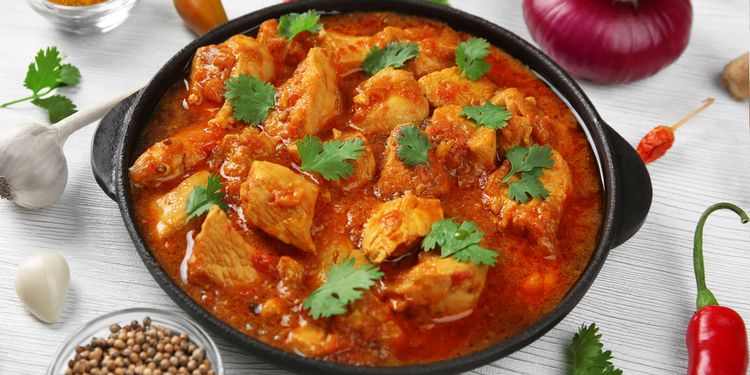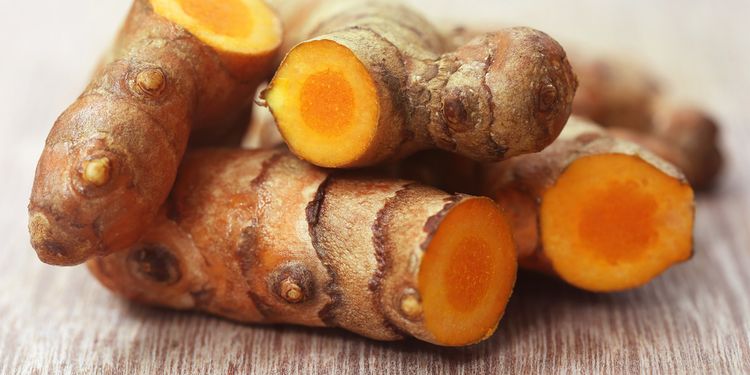Three Reasons I Make Turmeric a Staple in My Diet

I love how my spice cabinet is teeming with color. As the temperature drops, warming up with a hearty bowl of chicken curry soup is one of my favorite pastimes. The combination of warm flavors and bright colors always lifts my mood.
Turmeric is a staple in all my curries. A cousin to ginger, turmeric root ends up in my cupboard after it’s been harvested, baked, and compressed into powder. The distinctive yellow hue adds a pop of color to curries and dips. And it delivers an earthy yet subtly citrus flavor to food, along with numerous health benefits.
Turmeric Offers Medicinal-Grade Therapy
While not as notorious as superfoods such as ginger or cinnamon until relatively recently, turmeric arguably beats out the spice competition. With over 6,000 peer-reviewed articles backing turmeric’s benefits, this spice packs a serious health punch. Curcumin, the active ingredient in turmeric, makes it a potent medicinal agent.
Curcumin is among the top antioxidant compounds in the world. It ranks equal to or better than top-tier pharmaceutical drugs in many health categories, with minimal side effects.

Turmeric Can Help in These Areas
Reduces Pain and Inflammation
A sprained ankle means ice and Ibuprofen to reduce swelling. Studies show however, that downing too much Ibuprofen is detrimental to your gut health. Curcumin effectively combats general inflammation and pain. More specifically, it soothes various forms of arthritis, high cholesterol, and heart and autoimmune diseases.
As a marathon runner, I can confirm that joint protection is critical. I was elated to discover that the curcumin in my turmeric slows arthritis-related inflammation. Those with rheumatoid arthritis should consider curcumin supplements as a way to relieve their pain— curcumin demonstrated a higher capability to treat arthritic joints compared to generic arthritis drugs (diclofenac sodium) with fewer side effects.
If heart health is your problem, curcumin can help. The root cause of heart issues is oxidative stress, which harms blood vessel linings and causes bad cholesterol build-up. Lipitor and other statin drugs target bad cholesterol but can’t address oxidative stress like curcumin.
Curcumin also proved more potent than diabetic medications in reducing stress and inflammation to treat high cholesterol.
Your doctor may prescribe steroids if you’ve exhausted pharmaceutical resources. However, the danger of steroid use is the laundry list of side effects, which include acne, asthma, cancer, insomnia, mood swings, and nausea, to name just a few.
Curcumin is statistically comparable to steroids when it comes to disease management and reversal. However, because it has fewer side effects, experts agree that curcumin may be the safer, natural alternative.

Prevents Blood Clotting
Blood clots are terrifying. My mom suffered two pulmonary embolisms (PEs) and three deep vein thromboses (DVTs), once while on warfarin (the famous blood thinner meant to prevent them)! The cause? No one knows. Rounds of blood work revealed she was perfectly healthy.
Her doctor prescribed Aspirin and Xarelto to fend off her deadly clots. She went through months of morning injections, heavy bruising, and exhaustion.
Then, another doctor suggested lower doses of Xarelto and the addition of curcumin supplements, because curcumin works as a natural blood thinner. The benefits were fewer nasty side effects, and so far, it’s worked wonders for her health.
Improves Mental Health
Researchers tested how curcumin influenced patients with major depressive disorders (MDD) and found that it’s just as effective as Prozac.
Patients at risk for Alzheimer’s and dementia could also benefit, because studies show that sustained low doses of curcumin reduced beta-amyloid plaques. This “brain gunk” is responsible for cognitive degeneration.
Studies also demonstrate lower rates of Alzheimer’s/dementia in regions where turmeric is a cooking staple. The Indian sub-continent and East Asia see greatly reduced rates of degenerative diseases versus the United States and Europe. How’s that for a defense of more curry nights?

Fights Cancer
It turns out that all these health benefits are just the beginning. Cancer research provides the most thorough evaluation of curcumin; researchers now know that it targets cancer cells, killing them and preventing more from growing.
Researchers have found the most promising effects against breast, bowel, stomach, and skin cancer. Curcumin paired with chemotherapy does more to treat cancer cells than chemo alone. It also revitalizes damaged immune systems, which is a common side effect of chemotherapy.
Manages Food Metabolism
One huge night of Italian food and I’m bloated for days. Anti-acid and gas tablets barely manage the symptoms. Fortunately, turmeric wards off common gut health problems.
Your digestive system becomes increasingly sensitive over time, especially if you take prescription or OTC drugs regularly. For example, corticosteroid treatments for inflamed bowel diseases like IBS, Crohn’s Disease, and ulcerative colitis reduce pain symptoms, but they also worsen the condition by destroying the intestinal lining.
Curcumin’s anti-inflammatory effects, on the other hand, reduce pain while promoting good bacteria growth, treating and healing the gut.
Diabetics can rest easy knowing that curcumin outperformed the common diabetic drug, Metformin, by activating chemicals to improve insulin sensitivity by 400 times! Curcumin goes beyond symptom management by lowering blood sugar and reversing insulin resistance. More than that, curcumin fights diabetic-related issues like neuropathy and retinopathy by healing damaged blood vessels.

Turmeric Can Spice Up Your Meals
With Meats Like Fish and Beef
I coat white fish like basa in turmeric, salt, and pepper and saute it in ghee (clarified butter). Fresh lime juice or chopped mint highlights the acidic flavors contrasted with the creamy butter taste. I serve it with veggies and brown basmati rice for a delectable meal (hey, you have to treat yourself sometimes, right?).
I prep my chicken curry by dry rubbing turmeric, garlic, and salt onto the meat, then marinating it for a day. Indian Ayurvedic tradition uses ghee and turmeric as synergistic elements, which is why they pair so well together.
In Tea
Sipping on turmeric tea is my mini-vacation. Its sweet and spicy flavor is relaxing yet refreshing.
All you have to do is warm up equal parts water and organic coconut milk in a pan. Stir in one tablespoon of ghee and honey. Finally, sprinkle in one teaspoon of turmeric. Enjoy!
In Soup
Add turmeric to soups, chilis, and stews for another level of flavor.
I cook up my marinated chicken while lightly roasting cauliflower, carrots, and onions in a mix of coconut oil, salt, turmeric, garlic, and coriander. Add chicken broth and coconut milk for a creamy coconut chicken curry soup.
Other recipes include carrot and squash soups (the same principle applies to both). Cook the veggies until soft, add your choice of spices— turmeric included— puree, and simmer in broth or coconut milk. I garnish with cashews or pumpkin seeds for a little crunchy texture.

Summary
Curcumin is an excellent natural health alternative. It’s cost-efficient, effective, and contains minimal side effects. Taken in excess, curcumin may cause nausea, diarrhea, hypotension, and increased bleeding, but turmeric contains about 3% curcumin, so it’s hard to actually consume excessive amounts.
Sprinkle in turmeric for preventative healthcare. Throw a dash on your veggies for taste. However it’s used, you can bet that turmeric is a great addition to the pantry.
